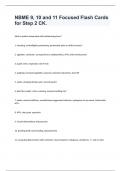NBME 9, 10 and 11 Focused Flash Cards
for Step 2 CK.
What is patient intoxicated with/withdrawing from?
1. sweating, unintelligibly questioning, persistently picks at clothes tremor?
2. agitation, confusion, unresponsive to antipsychotics, HTN, and tremulousness
3. pupils 1mm, respiratory rate 9/min
4. laughing, increased appetite, paranoia, injected conjunctiva, slow HR
5. ataxia, sleeping during exam, slurred speech
6. diarrhea, pupils >4mm, yawning, nausea/vomiting; Rx?
7. ataxia, seizures/delirium, assaultiveness/aggressive behavior, nystagmus on eye exam, tachycardia, HTN
8. HTN, chest pain, psychosis
9. visual hallucinations and paranoia
10. grinding teeth and sweating, hyponatremia
11. young boy/girl presents with confusion, slurred speech, nystagmus, sleepiness, +/- rash on face 12. excessive thirst, loss of inhibition, high body temp, really happy
13. bradycardia, hypotension, respiratory depression in patient taking oxycodone and change in kidney - correct answer 1. alcohol/benzodiazepine withdrawal (increased autonomic activity = tremors, anxiety, sweating, agitation, HTN, seizures, delirium tremens); Rx = lorazepam + fluids + vitamins (e.g. B12, thiamine, magnesium, iron, zinc)
2. alcohol/benzodiazepine withdrawal (increased autonomic activity = tremors, anxiety, sweating, agitation, HTN, seizures, delirium tremens)
3. opioid intoxication or heroin intoxication (constipation and pinpoint pupils); clonidine overdose can mimic this
4. marijuana intoxication (causes euphoria, conjunctival injection, hallucinations--this can look like meth use but go with conjunctival injection)
5. alcohol/benzo intoxication (need to monitor/replete deficient vitamins/intubate to protect airway; watch for hypoglycemia and respiratory acidosis)
6. opioid withdrawal (note: you can also see pupillary dilation in cocaine intoxication and amphetamine intoxication--go with diarrhea/yawning to help with diagnosis); Rx = buprenorphine
7. PCP intoxication (focus on nystagmus and aggressiveness to make diagnosis; can also see hallucinations; give benzos or haloperidol for severe sxs otherwise reassure)
8. cocaine intoxication (this can also be seen in amphetamine/meth use; can also feel like bugs are crawling on skin and have pupillary dilation; cocaine use can cause intracranial hemorrhage)
9. LSD intoxication (causes paranoia, flashbacks, visual hallucinations)
10. ecstasy/MDMA intoxication 11. inhalants (e.g. spray paint/glue)--can get perinasal dermatitis, nosebleeds, AMS, ataxia, hallucinations
12. amphetamine intoxication (euphoria, hypertension, restlessness, tachycardia, hallucinations)
13. opioid overdose; Rx = naloxone
14. meth/cocaine intoxication
15. alcohol intoxication
16. ecstasy (can also see low sodium)
17. aspirin/salicylate poisoning (MUDPILES)--causes a mixed metabolic a
4 days after being admitted to hospital, patient develops agitation, confusion, unresponsiveness to antipsychotics, HTN, and tremors--what is best management? - correct answer patient is in alcohol withdrawal--benzodiazepines (e.g. lorazepam or chlordiazepoxide)
6-24 hours: anxiety, palpitations, tremors, insomia
12-48 hrs: seizures, hallucinations
48 hrs -1 week: delirium tremens (confusion, hallucinations, autonomic instability)
Rx: benzodiazepines (e.g. lorazepam)
Also need to replete vitamins as alcoholics are deficient in thiamine, folate, vitamin B12, vitamin A, vitamin B6, magnesium (alcohol induces excretion of Mg), iron, and zinc, calcium (low magnesium can cause low calcium and low potassium) patient presents with loss of consciousness after exercising outside, vitals show fever, BP 105/70, and normal mental status exam--diagnosis? management? - correct answer heat exhaustion (inadequate salt
and water replacement)--management is to remove excess clothing and initiate cooling (e.g. immerse in cool water); can also see nausea/vomiting; <104F
note: if there was CNS dysfunction (altered mental status and hyperthermia (>104F); then diagnosis would be heat stroke (impaired thermoregulation); management for heat stroke is rapid ice water immersion +/- fluid resuscitation (if patient is hypotensive/signs of rhabdo start with fluids) + electrolyte correction; >104F and AMS = heat stroke
note: if it was just syncope, then they'll have to tell you something about BP dropping and there shouldn't be hyperthermia
what is the diagnosis?
1. patient with resting tremor, postural instability, visual hallucinations, and fluctuating cognition; develops over years
2. patient with ASCVD risk factors presents with stepwise decline in cognitive function
3. patient with chronic neurodegenerative signs and depression--diagnosis? most significant risk factor? treatment?
4. patient presents with concerning signs for dementia, but it was preceeded first by personality changes
5. patient presents with urinary incontinence, ataxia, and signs of altered cognition; Rx?
6. dementia develops over months, ataxia, involuntary jerking of head, trunk, and arms
7. ataxic gait, muscle weakness, paresthesia, abnormal reflexes, loss of proprioception and vibration sense; increased mean corpuscular volume - correct answer 1. Dementia with Lewy bodies: parkinsonism, visual hallucinations, fluctuating cognition




